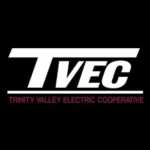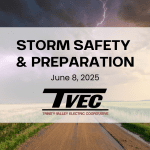
We’ve been getting calls and seeing social media posts that seem to indicate power companies are accessing and controlling thermostats. In case you are wondering, TVEC does not do that. However, the idea of “Demand Response” programs is not new, and they are used by some power companies throughout the country.
Quick Facts for TVEC members:
• TVEC does not have access to, or in any way control any devices in members’ homes.
• TVEC’s AMI metering system does not use wireless technology and does not communicate with any devices in members’ homes.
• TVEC members have access to their usage data through our Member Portal and the myTVEC app. This is the only data regarding member electricity usage that we record.
• If we ever decide to implement a demand response program, it would be completely voluntary for members.
• ERCOT can require utilities to reduce load in emergency situations, but they have no access to or control over individual consumers’ power consumption. ERCOT emergency load reduction happens in the form of rolling outages.
What is Demand Response?
The simple fact is that during high demand, power costs are much higher than at other parts of the day. Some power companies have worked to combat this by offering incentives to their customers to reduce their usage during peak demand periods by allowing the company to control their thermostat, water heater, electric car charging or other devices.
There is often a reduced electricity rate in exchange for the load control capabilities, so it can be a win-win for consumers and the company.
ERCOT, The Grid and Electricity Demand
While ERCOT is tasked with keeping the grid operating reliably, these types of Demand Response programs are primarily in place to lower costs for wholesale electricity at each individual utility.
When ERCOT requests voluntary conservation, that could certainly coincide with a peak demand that would trigger the use of these demand response systems. However, ERCOT does not have access to or control of the programs at each individual electric utility.
At times of genuine energy emergency, ERCOT may require mandatory load reductions. This requires quick action from utilities to reduce very large amounts of demand in the form of rolling outages.










